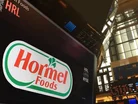Hormel Foods Tackles Inflation, Supply & Consumer Challenges

Hormel Foods Corporation, a Fortune 500 global branded food company, has been building strategies to improve the challenges regarding shifting consumer preferences, supply problems and rising inflation.
These challenges have posed significant world wide strain for the food and retail industry as well as their consumers.
Due to inflation, major companies like Nestle, PepsiCo, and Kraft Heinz have had to strive for affordable products for their customers whilst maintaining profitability.
Rising costs of raw materials, energy and transportation for the food industry has squeezed profit margins, while supply chain bottlenecks have led to shortages and delays.
Yet simultaneously, consumers have become increasingly conscious of sustainability, health, and convenience, driving demand for eco-friendly, plant-based, and online shopping options.
Businesses that adapt swiftly to these trends by optimising operations, diversifying offerings, and embracing innovation, seem better positioned to thrive in this volatile landscape.
Jim Snee, chairman of the board and president and chief executive officer of Hormel Foods, says regarding the fiscal year: “We delivered a strong first half, with consecutive quarters of better-than-expected earnings, a significant improvement in operating cash flows, continued foodservice strength, recovery in our international business and stable volumes across our business.”
And with Hormel Foods collaborating across the supply chain with key partnerships including major retailers like Walmart, Costco, Amazon, and Kroger for distribution, the company has got together to plan a better way forward.
Hormel Foods counters inflation, supply chain problems and shifting consumer preferences
Sustainability The company has made strides in sustainability by implementing innovative initiatives to reduce its carbon footprint and promote responsible sourcing practices.
These initiatives include cutting greenhouse gas emissions in half and assisting in making a sizable dent in its suppliers' emissions by 2030.
Technology Hormel Foods has also unveiled cutting-edge product developments to cater to evolving consumer preferences.
By utilising AI and machine learning instead of relying on massive surveys to analyse data, there are now over 50,000 data points to increase understanding of what consumers seek and how they use products.
Supply chain On the supply chain front, meanwhile, Hormel has focused on strengthened operations, such as optimising technology, to ensure efficient distribution and availability of its products across various channels.
Partnerships Hormel Foods also maintains strategic alliances with food service providers, ensuring a robust presence in the commercial sector.
The company engages with reputable meat suppliers and agricultural firms to secure a consistent influx of high-quality raw materials.
Recently, Hormel Foods have grown market shares across several flagship brands, including Black Label, Planters, SPAM and Jennie-O.
Jim Snee has also stated that there will be ongoing improvements across Hormel Foods supply chain for the foreseeable future.
Who is Hormel Foods, and what has it achieved in the past year?
Hormel Foods is a renowned food production company based in Austin, Minnesota. Founded in 1891.
The company has a rich history spanning over a century, establishing itself as a leading player in the food industry.
Hormel operates globally, supplying products to grocers, mass merchandisers, membership clubs, foodservice operations, and other food processors.
The company's retail segment includes the brands Spam and Jennie-O, Skippy, Applegate, Justin's and Wholly, and the company now owns American snack food company, Planters.
Recently, Hormel has achieved several notable milestones, including:
- Expanding its product portfolio.
- Introducing new and innovative offerings to meet changing consumer preferences.
- Forging strategic partnerships with prominent retailers, including Walmart and Amazon, to expand its distribution reach.
- The successful launch of a plant-based protein line.
And with these inflation, supply chain and consumer challenges in mind, Hormel Foods have changes underway now.
Hormel Foods plans already in action
To utilise its supply chain to transform and modernise the company, new technology is already being used across the supply chain to improve efficiency, and achieve saving across categories including logistics, warehousing, direct supplies and indirect supplies.
Hormel has also leaned into entertaining innovation, and introduced several new snacking items including: Planters salt and vinegar cashews, Corn Nuts loaded taco-flavour corn kernels, and Hormel Gatherings summer-themed hard salami and pepperoni tray.
Additionally, after challenging Q2 results regarding Hormel's retail sector, there is a renewed drive and focus on growing the retail business.
Such focus includes developing global operations, partnerships and innovation across areas such as Brazil, China, Philippines and South Korea.
--------------
Make sure you check out the latest news at Food Digital, a BizClik brand.




